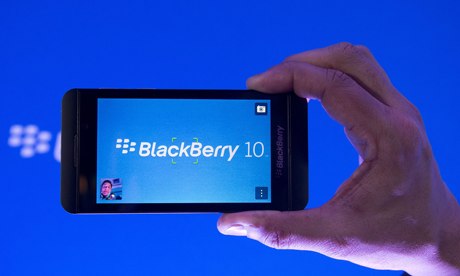
BlackBerry's new chief executive John Chen signalled a new strategy focusing on providing secure email and device management to large businesses as the company plunged to a quarterly net loss of $4.4bn, on revenues down 56% to just $1.2bn.
The huge loss, driven partly by enormous writedowns on existing inventory, is the largest in the company's history – but Chen insisted that the company is "very much alive" as he tries to shift it away from making handsets.
The company announced a five-year partnership with Taiwan's Foxconn, which already makes products for Apple and Microsoft, that will see it jointly develop and manufacture smartphones for the Canadian company, effectively taking over manufacturing operations and much of the risk of being left with unsold inventory.
BlackBerry shipped just 1.9m handsets during the quarter, but customers bought a total of 4.3m handsets from outlets – of which 3.2m were the ageing BB7 model. Since its launch in January, only 4.6m BB10 handsets have been sold, making up less than half of total sales.
BlackBerry stock began falling as markets digested the news, which was released ahead of their opening.
Chen, who only took over 45 days ago following a radical boardroom shakeup that ousted previous chief Thorsten Heins, acknowledged that the company has lost money on its handset business as part of the business's degradation over the past two years. Competition from Apple and Samsung has squeezed it from a commanding position in the consumer market back to its origins as a provider of secure email and communications for large "enterprise" businesses.
"The most immediate challenge for the company is how to transition the devices operations to a more profitable business model," said Chen, who formerly managed a turnaround at the software company Sybase.
But Chen said that more than 80% of BlackBerry's existing subscriber base are enterprise customers, which could provide a platform for future business selling "mobile device management" (MDM) services for Apple and Android devices as well as BlackBerrys.
Analysts expressed some doubts about the move to Foxconn. Colin Gillis, an analyst at BGC Partners, told Associated Press that allowing BlackBerry to be made in China could pose a problem for a company that relies on governments for a lot of its business. "It opens up some security concerns. If you are a government agency with national security data running through your phones, do you have concerns now that they are made by Foxconn?" Gillis wondered.

